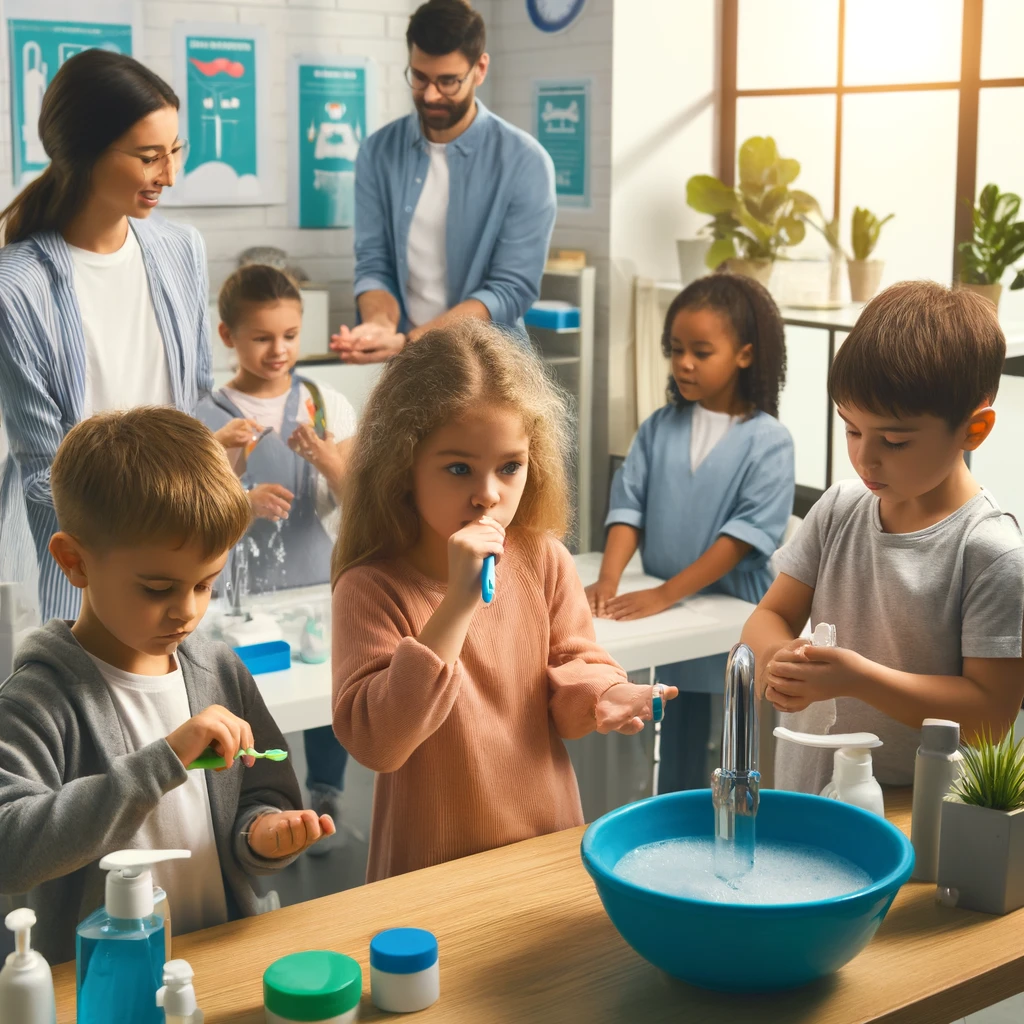
Table of Contents
Nutrition and Healthy Eating (kids daily essentials)

The importance of a balanced diet for growing children cannot be overstated. A balanced diet provides the foundation for stable energy levels, strong bones, and teeth, crucial for a child’s growth and development [1]. Harvard University School of Public Health emphasizes that such a diet should include a rich variety of fruits and vegetables, whole grains, and appropriate amounts of protein from sources like seafood, lean meats, poultry, eggs, beans, and unsalted nuts and seeds [2].
This balanced approach ensures that children receive the essential nutrients required for their overall health, aiding in their physical and cognitive development.
Incorporating fruits and vegetables into daily meals is vital for children’s health and well-being. These food groups are packed with essential nutrients that are critical for growth, development, and strong immunity [3]. To make fruits and vegetables a consistent part of children’s diets, it’s helpful to: – Encourage a variety of fruits and vegetables to keep meals interesting and colorful [4]. – Utilize fresh produce to provide vitamins, fibers, minerals, and nutrients necessary for a child’s healthy growth [1]. – Follow guidelines like the Kid’s Healthy Eating Plate, which recommends filling half the plate with fruits and vegetables for the best nutritional balance [5]. This approach not only supplies the necessary nutrients but also instills healthy eating habits that can last a lifetime.
The role of hydration in a kids daily essentials routine is as crucial as solid food intake. Water is unanimously recommended as the best drink to keep children hydrated, containing no extra calories or sugars that can harm their health [6]. Healthy drink choices for children include: – Sterilized drinking water and milk as primary sources of hydration [7]. – Limited amounts of 100% fruit juice and homemade smoothies, which can provide some nutritional benefits if consumed in moderation [7]. Experts advise against regularly offering sports drinks, soft drinks, and flavored mineral waters due to their high sugar content and acidity [6]. Teaching children to choose healthier drinks aids in better hydration practices and contributes to their overall health and well-being.
Personal Hygiene

Teaching children the basics of daily bathing and oral care is crucial for their health and well-being. Introducing these fundamental hygiene routines at an early age helps children understand the importance of cleanliness. Parents and caregivers should demonstrate how to properly wash the body and hair, emphasizing the necessity of using soap and water to remove dirt and germs. Equally important is teaching children about oral hygiene, including the correct way to brush and floss their teeth.
This not only helps in preventing dental problems but also instills a sense of responsibility towards personal cleanliness[4]. To make these routines more appealing, parents can use colorful toothbrushes, flavored toothpaste, and fun bath toys, turning hygiene practices into enjoyable activities[13].
The importance of handwashing cannot be overstated, especially in preventing illness. Effective handwashing with soap and water removes germs that can lead to diarrhea, respiratory infections, and even skin and eye infections. The Centers for Disease Control and Prevention (CDC) emphasizes washing hands with soap and water as the best method to keep germs at bay. However, in situations where soap and water are not available, using a hand sanitizer with at least 60% alcohol is recommended[6][7]. Educating children on the proper handwashing technique—scrubbing hands for at least 20 seconds—and encouraging its practice before meals, after using the restroom, and after playing outside are vital steps in reducing the transmission of illnesses[8][9][13].
Encouraging personal grooming habits from a young age is essential for children’s development into well-groomed adults. This includes not only daily routines like bathing and brushing teeth but also dressing neatly and taking care of one’s belongings. Parents play a key role in setting a good example by maintaining their grooming and hygiene standards[14]. Demonstrating and reinforcing these habits in children helps them appreciate the value of presenting themselves cleanly and respectfully in various social settings[15]. As children grow, they become more conscious of their body image and social perceptions, making the early establishment of good grooming habits an invaluable part of their upbringing[5].
Physical Activity and Play

The importance of regular physical activity for children cannot be overstated, both for their physical and mental well-being. Engaging in regular exercise has been shown to provide a myriad of benefits for young ones. Physically, it helps in the improvement of cardiorespiratory fitness, the building of strong bones and muscles, and the control of weight[3].Mentally, it has been linked to better mental health outcomes as children age, including decreased symptoms of depression, anxiety, and pain[1][4].
Furthermore, children who are physically fit are not only better equipped to handle physical challenges but are also more adept at navigating emotional challenges[2]. The positive impact of regular exercise extends to behavioral improvements, even among children with behavioral health disorders such as autism and attention-deficit/hyperactivity disorder[5].
Finding the right balance between outdoor play and structured sports is essential for the holistic development of children. Kids of all ages benefit from a mix of both organized sports and free play[6]. Organized sports, such as running, tumbling, and swimming, focus on developing basic skills and are an excellent starting point for children[7]. On the other hand, self-organized play, or activities that children organize on their own, plays a crucial role in their development by fostering creativity, independence, and problem-solving skills[8]. However, it’s important to note that too many restrictions on outdoor risky play may negatively impact their development, highlighting the need for a balanced approach that encourages both structured and unstructured play[9].
In today’s digital age, managing screen time has become a critical aspect of promoting active playtime among children. Establishing clear rules and setting reasonable limits on the use of digital media are essential steps in encouraging children to engage in unplugged, unstructured playtime[11]. For children aged 2 to 5 years, routine or regular screen time should be limited to less than one hour per day, focusing primarily on educational content and ensuring that sedentary screen time does not replace active play[12][13]. The American Psychological Association recommends that younger children under 12 should only have one hour per day of screen time, while older teens may have up to two hours[14]. Active play is vital for young children’s development, as it allows them to explore their surroundings, develop motor skills, and learn through play[15].
Educational Activities

The role of reading and storytelling in children’s lives extends far beyond mere entertainment; it is a cornerstone of cognitive development. Through the lens of various studies, it’s clear that engaging children in reading and storytelling has profound impacts on their brain development, language skills, and emotional intelligence [8]. These activities not only prepare children for academic success by enhancing their language abilities but also foster a lifelong love for learning [9].
Furthermore, storytelling introduces children to diverse cultures and historical events, enriching their knowledge and promoting creative thinking [10]. This multifaceted approach to learning through stories significantly contributes to a child’s ability to empathize with others, understand complex emotions, and navigate the world around them with an informed and open mind [11].
Incorporating math and science into daily activities can transform these subjects from abstract concepts into tangible and enjoyable experiences for children. Simple yet engaging strategies, such as playing “I Spy” to recognize numbers in a grocery store or organizing a shape hunt, can significantly enhance a child’s numerical and geometrical understanding [12]. Activities like using laundry to promote matching and sorting skills, or engaging in cooking to understand measurements and volume, make math concepts relatable and fun [13]. Moreover, interactive STEM and STEAM activities at home can spark a child’s curiosity about how the world works, encouraging them to explore and question their surroundings [14]. By embedding math and science into everyday life, parents and educators can create a stimulating environment that fosters a child’s cognitive development and prepares them for future academic endeavors [15].
Creative play and engagement in the arts play a pivotal role in the emotional and social growth of children. Through activities such as creative craft kits, children have the opportunity to express their feelings and experiences in a supportive and imaginative way, which also enhances their motor skills [16]. This form of play is not only about entertainment but serves as a critical tool for emotional expression and cognitive development. It enables children to explore their imagination, develop dexterity, and strengthen physical, cognitive, and emotional abilities [17]. Furthermore, creative learning projects and play activities are instrumental in fostering a child’s natural creativity, teaching them valuable life skills such as problem-solving, empathy, and collaboration [18]. These experiences are fundamental in building a well-rounded individual capable of navigating the complexities of emotional and social interactions [19].
Benefits And Limitations
Benefits: 1. Nutritional Balance: kids daily essentials, including a variety of healthy foods, vitamins, and supplements, ensure that children receive the necessary nutrients for their growth and development. This is particularly beneficial in preventing nutritional deficiencies and promoting overall health. 2. Routine and Structure: Having a set of daily essentials for kids, such as specific meal times, bedtime routines, and hygiene practices, helps establish a structured routine. This consistency aids in managing expectations and reduces anxiety, contributing to a stable environment for emotional and physical growth. 3. Educational Value: Integrating educational materials and activities as part of kids daily essentials can stimulate cognitive development and foster a love for learning. Daily reading, educational games, and interactive learning activities enhance critical thinking and problem-solving skills.
Limitations: 1. Cost Implications: The cost of maintaining a comprehensive list of daily essentials, especially high-quality products or organic food items, can be significant. This financial burden may not be feasible for all families, leading to disparities in access to these resources. 2. **Over-scheduling:** Structuring too many activities or essentials into a child’s day can lead to over-scheduling, reducing their free playtime and potentially causing stress and burnout. Children also need unstructured time to explore and develop their creativity and problem-solving skills.
Solutions: 1. Budgeting and Planning: To mitigate the cost implications, families can plan and budget for kids daily essentials more effectively. Bulk purchasing, looking for sales, and prioritizing what essentials are truly necessary can help manage expenses. Community resources and programs can also offer support. 2. Balanced Scheduling: Parents and caregivers can ensure that while structured routines are beneficial, there is also ample time for free play and relaxation in a child’s schedule. It’s essential to strike a balance between activities and downtime, allowing children to explore their interests spontaneously.
Summary: kids daily essentials play a crucial role in ensuring a balanced diet, structured routine, and educational development, which are all vital for a child’s growth and well-being. However, the financial burden and the risk of over-scheduling are significant considerations. By adopting strategic budgeting and planning, along with ensuring a balanced approach to scheduling, families can navigate these challenges. The ultimate goal is to create a nurturing environment that supports a child’s development while also accommodating the family’s financial capacity and lifestyle.
Tips And Best Practices
Establish a Routin – Children thrive on routine as it provides them with a sense of security and helps them understand what is expected. Establishing a daily routine that includes essential activities such as meal times, homework, playtime, and bedtime can greatly benefit a child’s physical and emotional well-being. For example, a consistent bedtime routine can improve sleep quality, while scheduled meal times can help ensure they receive the nutrition they need. Use visual schedules or charts for younger children to help them understand and follow their daily routine.
Nutrition and Hydration – A balanced diet is crucial for children’s growth and development. Ensure their daily essentials include a variety of fruits, vegetables, proteins, and grains to provide them with the necessary vitamins and minerals. Incorporate foods rich in omega-3 fatty acids, such as fish, which are important for brain development. Additionally, emphasize the importance of staying hydrated, especially with water, rather than sugary drinks. Teaching kids about the benefits of healthy eating habits from a young age can set the foundation for a lifetime of good health.
Physical Activity – Encouraging regular physical activity is essential for children’s physical and mental health. Aim for at least 60 minutes of moderate to vigorous exercise each day. This can include structured activities like sports or dance classes, as well as free play outdoors. Physical activity not only helps with the development of strong bones and muscles but also contributes to better sleep and mood. Make physical activity a family affair by going for walks, bike rides, or playing games together, making it a fun part of your daily routine.
Mental Stimulation and Downtime – Balance is key when it comes to children’s activities. Alongside physical activity, kids need opportunities for mental stimulation through reading, puzzles, educational games, and creative play. These activities support cognitive development and problem-solving skills. Equally important is allowing downtime for relaxation and unstructured play to foster imagination and provide a necessary break from the rigors of structured activities. Ensuring a balance between stimulating activities and rest can help prevent overstimulation and stress in children.
Hygiene Habits – Instilling good hygiene practices from a young age is vital for children’s health and well-being. Teach them the importance of washing their hands regularly, especially before meals and after using the bathroom, to prevent the spread of germs. Daily bathing, brushing their teeth twice a day, and changing into clean clothes are also essential habits to maintain cleanliness and promote health. Making these practices part of their daily routine, perhaps by incorporating fun songs or games, can make them more appealing and easier to adopt for young children.
Faqs
Q: What constitutes a balanced diet for children, and why is it important? A: A balanced diet for children includes a variety of foods that supply all the nutrients necessary for their growth and development. This encompasses proteins for building muscle, carbohydrates for energy, fats for brain development, and vitamins and minerals for various bodily functions. Fruits and vegetables are crucial for vitamins, minerals, and fiber. Dairy or its alternatives are important for calcium and vitamin D, supporting bone health. The importance lies in supporting optimal growth, preventing obesity, and establishing healthy eating habits that can last a lifetime.
Q: How can parents encourage good personal hygiene habits in children? A: Parents can encourage good personal hygiene by making it a consistent part of the daily routine and modeling the behavior themselves. For example, they can brush their teeth alongside their children to demonstrate proper oral care, explain the importance of handwashing before meals and after using the restroom, and make bath time fun with toys or special soaps. Encouragement and positive reinforcement, as well as explaining the reasons behind hygiene practices in an age-appropriate way, can help children understand the value of cleanliness for health.
Q: Why is physical activity crucial for children, and how can it be balanced with screen time? A: Physical activity is crucial for children’s physical and mental health as it supports cardiovascular fitness, strength, flexibility, and mental well-being by reducing symptoms of anxiety and depression. To balance it with screen time, parents can set clear limits on the use of electronic devices and encourage outdoor play, sports, and other active pursuits. Offering alternatives like family walks, bike rides, or participating in sports together can also provide motivation. The key is finding activities that children enjoy, which can naturally reduce the allure of screen time.
Q: How can educational activities be seamlessly integrated into a child’s daily routine? A: Educational activities can be integrated into daily routines by incorporating learning opportunities into everyday activities. For example, reading stories at bedtime can enhance literacy skills; cooking together can teach measurements and fractions for math skills; and simple science experiments using household items can make learning fun and interactive. Encouraging questions and curiosity in everyday situations can turn even a grocery shopping trip into a learning experience. The goal is to make learning a natural and enjoyable part of the day.
Q: What is the role of creative play in a child’s development, and how can it be encouraged? A: Creative play is vital for a child’s emotional growth and development of imagination, problem-solving skills, and emotional regulation. It allows children to express themselves, explore ideas, and build social skills through interaction. Encouraging creative play can be as simple as providing access to arts and crafts materials, dressing up costumes, or space for make-believe play. Limiting screen time and encouraging unstructured playtime also give children the opportunity to use their imagination and creativity to fill their time. Supporting their interests and participating in creative activities together can further encourage their creative development.
In conclusion, ensuring that children have their daily essentials is crucial for their overall growth and development. Providing a balanced diet with fruits and vegetables, promoting personal hygiene habits, encouraging physical activity and play, and incorporating educational activities into their daily routine are all important factors. By prioritizing these essentials, parents can help their children establish healthy habits that will benefit them throughout their lives. It is essential to remember that every child is unique, and finding the right balance that works for them is key. With the right guidance and support, parents can help their children thrive and reach their full potential.
References :
1.The Importance of Good Nutrition for Kids. (n.d.) retrieved April 19, 2024, from www.nationwidechildrens.org
2.11 Important Components of kids daily essentials Nutrition. (n.d.) retrieved April 19, 2024, from www.parents.com
3.Children’s diet – fruit and vegetables. (n.d.) retrieved April 19, 2024, from www.betterhealth.vic.gov.au
4.Nutrition for kids: Guidelines for a healthy diet. (n.d.) retrieved April 19, 2024, from www.mayoclinic.org
5.Kid’s Healthy Eating Plate | The Nutrition Source. (n.d.) retrieved April 19, 2024, from www.hsph.harvard.edu
6.Hydration tips for children. (n.d.) retrieved April 19, 2024, from www.healthdirect.gov.au/hydration-tips-for-children
7.Hydration for kids – How much is enough?. (n.d.) retrieved April 19, 2024, from www.hipp.ph
8.Benefits & Importance of Reading to Children. (n.d.) retrieved April 19, 2024, from www.all4kids.org
9.Reading and storytelling with babies and children. (n.d.) retrieved April 19, 2024, from raisingchildren.net.au
10.The Importance Of Storytelling To Kids And Benefits. (n.d.) retrieved April 19, 2024, from www.carepointeacademy.com
11.The Vital Role of Reading for Kids. (n.d.) retrieved April 19, 2024, from hoorayheroes.com/the-vital-of-role-reading-for-kids
12.8 Easy Ideas to Add Math Into Your Daily Routine. (n.d.) retrieved April 19, 2024, from www.pbs.org
13.Simple Everyday Ways to Help Kids Practice Math. (n.d.) retrieved April 19, 2024, from blog.schoolspecialty.com
14.23 Fun STEAM and STEM Activities for Kids. (n.d.) retrieved April 19, 2024, from www.parents.com
15.Engaging Math Activities for Kids. (n.d.) retrieved April 19, 2024, from sciencekiddo.com/math-for-kids/
16.The Importance of Play in Emotional Development For …. (n.d.) retrieved April 19, 2024, from www.fiestacrafts.co.uk/blog/article.php?DOC_INST=27
17.The Importance of Play in Promoting Healthy Child …. (n.d.) retrieved April 19, 2024, from publications.aap.org
18.The Importance of Arts and Crafts for Early Childhood …. (n.d.) retrieved April 19, 2024, from www.cmosc.org/benefits-of-art-during-early-childhood/
19.Why Is Creative Play Important For Children’s Development?. (n.d.) retrieved April 19, 2024, from redmonkeyplay.co.uk




Leave a Reply